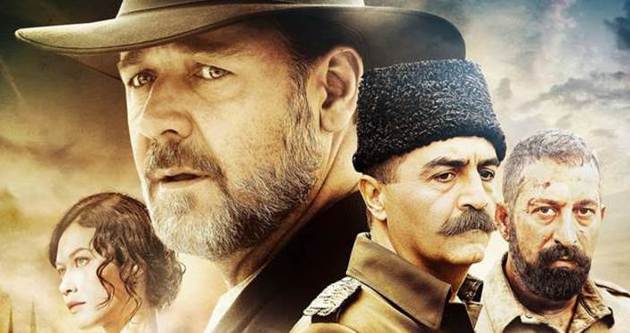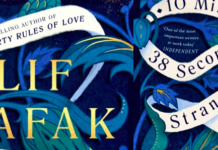No, that headline is not a misprint. It was my impression upon seeing The Water Diviner (Son Umut), a new film that opened in cinemas this week.

Initially, my Turkish girlfriend and I were intrigued by the film, which takes place in Turkey around the end of the First World War and the beginning of the Turkish Independence War. Russell Crowe stars as an Australian farmer, Connor, whose three sons were killed in the battle of Gelibolu (Gallipoli). Crowe, rugged and intense as always, travels to Turkey to try and find the remains of his sons, and to bring them home. Along the way, he befriends a young Turkish boy (who speaks remarkably good English for a World War I-era boy from a working class family), and also the boy’s mother (played by Ukrainian-born actress Olga Kurylenko, who, to her credit, plays a convincing Turkish woman whose husband also died at Gelibolu).
Amidst Connor’s search for his lost sons, we get some beautifully lit scenes of Istanbul, as well as the Dardenelles, with a bit of Turkish history sprinkled here and there. Thankfully, there is a fairly solid Turkish cast (particularly Yılmaz Erdoğan, as Major Hasan, a Turkish officer who sympathizes with the yabancı father and also aids in the search).
The problem, as we watched the film, was that so much of it seemed familiar and/or superfluous.
For example: As we see in the film’s opening scene, Connor has a knack for locating underground water. The film never really makes us understand why we need to know this, except perhaps to add some mystical significance. He could have whispered to horses, or perhaps been haunted by ghostly images of his wife (who, unable to cope with the deaths of her sons, has committed suicide), and the non-effect would be the same. The water divining business just comes across as a bit of extra seasoning to spice up a character who the writers evidently thought needed more shading. (As if a grieving father travelling half way around the world to a hostile, war-torn country to locate and bury his dead sons was not interesting enough.)
Also, the scenes where we see Connor and the Turkish widow (who also has an amazing command of English, and whose veil seems to come and go depending on her moods) are predictable, as if cut and pasted from The Last Samurai. At first, she is deeply hostile; he is “the enemy.” Russell Crowe’s Connor plays with her son, drinks Turkish coffee, acts respectful to her aging father, while the widow’s confidantes exchange girlish giggles about “How handsome he is!” and the widow hides her blush.
By the time the film nears the end, with a few not-so-surprising twists along the way, I was waiting for Crowe’s character to dawn a Turkish uniform, cry out “Ozgurluk!” (“Free-dom!”) and die fighting the Greeks alongside his newfound Turkish brothers.
Thankfully, the film wasn’t that bad. It was just too much of a patchwork of other movies, with nothing really new to add except pleasing Anatolian landscapes and a nice Turkish flavor. Perhaps we just expected the wrong things, not having read any advance notices on the film. I think I maybe expected there to be more emphasis on the historical battle, as well as the rise of Atatürk, as seen from a foreign perspective. Instead, these events are just window-dressing, a tension-adding backdrop.
In one scene, the Greek invaders are rapidly approaching, creating havoc and mayhem. What happens? Does Major Hasan say, “Anyway, good luck, man. İyi günler!” and get to fighting those invaders? Not really. The writers apparently decided that he should take his sweet time, at least long enough for the major and the Crowe character to exchange tender, manly dialogue. Shouldn’t we be busting ass out of here to fight the enemy? Not just yet: I want to hear how Russell Crowe pronounces “teşekkürler.”
Hell, I was all but ready for him to say: “Totonka! Totonka!” With a herd of buffaloes suddenly bursting across the plains.
Actually, one of the best scenes in the movie ends up being wasted. Crowe’s Connor, the grieving father, angrily charges Major Hasan. “You killed my sons!” he rages. “You invaded us!” Major Hasan coolly reminds him. Here was an opportunity to explore the tragic (tragic for the Australians, actually, but a triumph for the Turks) fall-out of the Gelibolu Battle, and its effects on the survivors, from an interesting perspective. But the filmmakers appeared to have been gun-shy, fearful of offending. So they quickly move on, and get back to safer ground – ground that has already been covered to death before.
James Tressler is a writer, teacher and journalist. He lives in Istanbul.









